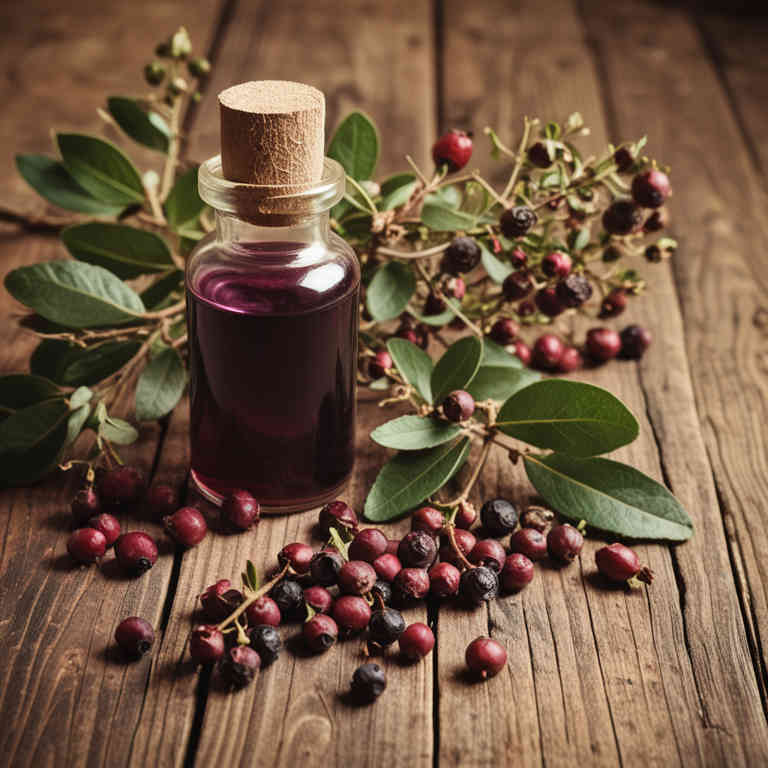Vaccinium myrtillus tincture for medicinal use

Vaccinium myrtillus tincture is a concentrated liquid extract made from the dried berries of the common bilberry plant.
This preparation is commonly used in herbal medicine for its rich content of antioxidants, particularly anthocyanins. It is traditionally employed to support eye health, improve circulation, and reduce inflammation. The tincture is often taken orally in small doses to address conditions like vision problems and vascular issues.
Herbalists also use it as a general tonic to enhance overall health and vitality.
Uses
Vaccinium myrtillus tincture has been used to treat a variety of ailments throughout history, particularly in traditional medicine practices across Europe.
Historically, it was valued for its potential to alleviate digestive issues, reduce inflammation, and support immune function. In traditional herbalism, the tincture was also used to address respiratory conditions and skin ailments due to its antioxidant and antimicrobial properties. Modern research suggests it may have applications in supporting cardiovascular health and managing oxidative stress.
Today, it is often used as a complementary therapy in holistic health practices, though it should be used under the guidance of a qualified healthcare provider.
Benefits
Vaccinium myrtillus tincture has health benefits such as supporting immune function, reducing inflammation, and promoting skin health.
This preparation, derived from the bilberry plant, is rich in antioxidants, particularly anthocyanins, which help protect cells from oxidative stress. It may also aid in improving vision and circulation due to its high concentration of bioflavonoids. Traditionally used in herbal medicine, it is believed to support urinary tract health and enhance cognitive function.
Its natural properties make it a valuable addition to holistic health practices.
Constituents
Vaccinium myrtillus tincture active constituents include flavonoids, anthocyanins, proanthocyanidins, tannins, and essential oils.
These compounds contribute to the tincture's antioxidant, anti-inflammatory, and antimicrobial properties. Flavonoids and anthocyanins help neutralize free radicals, supporting cellular health and reducing oxidative stress. Proanthocyanidins are known for their ability to strengthen blood vessels and improve circulation.
Tannins provide astringent effects, which may aid in digestive health and wound healing.
Preparation
To make Vaccinium myrtillus tincture, first gather fresh or dried blueberries (Vaccinium myrtillus) and ensure they are clean and free from pesticides.
Next, place the berries in a clean glass jar and cover them completely with high-proof alcohol, such as vodka or grain alcohol, leaving about an inch of space at the top. Seal the jar tightly and store it in a dark, cool place, shaking it gently every few days for four to six weeks to allow the extraction process to occur. After the steeping period, strain the liquid through a fine mesh strainer or cheesecloth to remove the plant material.
Finally, transfer the tincture to a dark glass bottle and store it in a cool, dry place, away from direct sunlight.
Side Effects
Vaccinium myrtillus tincture may lead to gastrointestinal discomfort, including nausea, vomiting, and diarrhea, due to its high concentration of active compounds.
It may also cause allergic reactions in individuals sensitive to the plant species, manifesting as rash, itching, or difficulty breathing. Long-term use could potentially affect liver function, as some herbal preparations are metabolized through the liver. Additionally, interactions with certain medications, such as anticoagulants or diabetes treatments, may occur, increasing the risk of adverse effects.
It is important to consult a healthcare professional before using this tincture, especially for individuals with pre-existing health conditions.